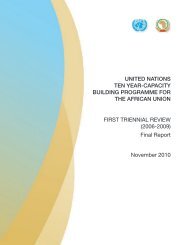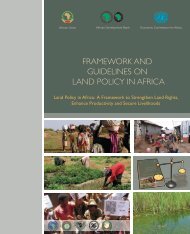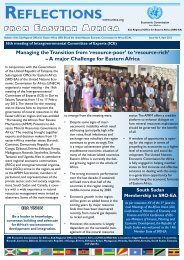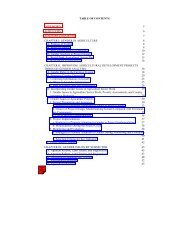A Decade of NEPAD - Economic Commission for Africa - uneca
A Decade of NEPAD - Economic Commission for Africa - uneca
A Decade of NEPAD - Economic Commission for Africa - uneca
You also want an ePaper? Increase the reach of your titles
YUMPU automatically turns print PDFs into web optimized ePapers that Google loves.
68 A <strong>Decade</strong> <strong>of</strong> <strong>NEPAD</strong>: Deepening <strong>Africa</strong>n Private Sector and Civil Society Ownership and Partnership<br />
The APRM is loosely based on models <strong>of</strong> state governance<br />
review such as the model used to review economic<br />
governance practices by the OECD. However, whilst existing<br />
models <strong>of</strong> peer review undoubtedly influenced the<br />
thinking behind the design and functions <strong>of</strong> the APRM,<br />
the <strong>Africa</strong>n version <strong>of</strong> the peer review makes significant<br />
departures and additions to the OECD model.<br />
The APRM process is in five stages:<br />
ӹ Preparation and Self Assessment – The country under review,<br />
with the assistance <strong>of</strong> the APR Secretariat, prepares<br />
an up-to-date background document on the democratic,<br />
political, economic, corporate and social conditions in<br />
the country. This stage includes what is <strong>of</strong>ten referred to<br />
as the country’s governance “self-assessment”.<br />
ӹ Country Review Mission – The country is visited by the<br />
APR Team, who are a group <strong>of</strong> independent <strong>Africa</strong>n<br />
experts under supervision <strong>of</strong> the Panel and the Secretariat.<br />
The national government and APRM Secretariat<br />
are responsible <strong>for</strong> ensuring that the APR Team will<br />
be enabled to carry out its review smoothly and with<br />
full access to all relevant sources <strong>of</strong> in<strong>for</strong>mation and<br />
stakeholders as are deemed necessary by the APR Team.<br />
ӹ Drafting <strong>of</strong> Mission Report – The APR Team prepares<br />
and drafts a country report, based on the findings <strong>of</strong> the<br />
APR Secretariat (Stage 1) and the country visit (Stage 2).<br />
This report should summarise the findings concisely and<br />
analyse their implications <strong>for</strong> the country’s governance<br />
and socio-economic development.<br />
ӹ Submission <strong>of</strong> the Country Review Report – The APR<br />
Team submits the report to the APR Panel, who are then<br />
responsible <strong>for</strong> reviewing the report in accordance with<br />
its mandate. Once this has been done, the APR Panel<br />
submits its recommendations, along with the report<br />
to the APR Forum. The APR Forum then considers<br />
both the report and the recommendations submitted,<br />
and decides what further action to take according to<br />
its mandate.<br />
ӹ Presentation and Official Publication <strong>of</strong> the Report –<br />
The country report is made accessible to the public, as<br />
well as those recommendations <strong>of</strong> the APR Panel that<br />
have been deemed appropriate by the APR Forum. The<br />
report is tabled <strong>for</strong>mally and publicly at all regional<br />
and continental organisations, such as the Pan-<strong>Africa</strong>n<br />
Parliament (PAP), the <strong>Africa</strong>n <strong>Commission</strong> on Human<br />
and People’s Rights (ACHPR), the Peace and Security<br />
Council (PSC) and the <strong>Economic</strong> and Social Council<br />
(ECOSOC) <strong>of</strong> the <strong>Africa</strong>n Union and the Regional<br />
<strong>Economic</strong> Community <strong>of</strong> the region in which the country<br />
is a member.<br />
In order to ensure that a level <strong>of</strong> oversight quality is maintained<br />
and that minimum standards are adhered to, the <strong>Africa</strong>n<br />
Peer Review Panel <strong>of</strong> Eminent Persons (APR Panel), a<br />
seven-member panel <strong>of</strong> recognized and respected <strong>Africa</strong>ns,<br />
is responsible <strong>for</strong> reviewing each country’s activities and<br />
making recommendations on how shortcomings might<br />
be rectified.<br />
Additionally, the APR Panel appoints a member to act<br />
as the focal point between the Panel and a participating<br />
country, and leads a number <strong>of</strong> support missions to the<br />
country during its self-assessment process to ensure that<br />
sufficient and necessary consultation with stakeholders<br />
takes place. The Panel can, under certain circumstances,<br />
request that a country which has prepared a draft country<br />
assessment, review its submission and resubmit it, if<br />
the Panel feels there is sufficient cause <strong>for</strong> concern that<br />
minimum standards have not been met during a country’s<br />
self-assessment process.<br />
Significantly, at the early stages <strong>of</strong> the peer review process,<br />
the APRM: Organization and Process document outlines<br />
the importance <strong>of</strong> a fully inclusive consultative process.<br />
The importance <strong>of</strong> the participation <strong>of</strong> civil society and<br />
civic organizations in the APRM is strongly rein<strong>for</strong>ced by<br />
the core documentation <strong>of</strong> the mechanism.<br />
Section 1.3 <strong>of</strong> the APRM document titled “Objectives,<br />
Standards, Criteria and Indicators <strong>for</strong> the <strong>Africa</strong>n Peer<br />
Review Mechanism” (OSCI) states:<br />
The overarching goal <strong>of</strong> the APRM is <strong>for</strong> all participating<br />
countries to accelerate their progress towards adopting<br />
and implementing the priorities and programmes <strong>of</strong><br />
the New Partnership <strong>for</strong> <strong>Africa</strong>’s Development (<strong>NEPAD</strong>),<br />
achieving the mutually agreed objectives and compliance<br />
with best practice in respect to the areas <strong>of</strong> governance and<br />
development.<br />
This can only be achieved through the sustained ef<strong>for</strong>ts <strong>of</strong> the<br />
country itself, involving all stakeholders. It requires that each<br />
country carefully develops a Programme <strong>of</strong> Action with time<br />
bound objectives and linked to national budgets to guide all<br />
stakeholders in the actions required by all – government,<br />
private sector, civil society – to achieve the country’s vision<br />
(Section 1.3 – OSCI 2003).







